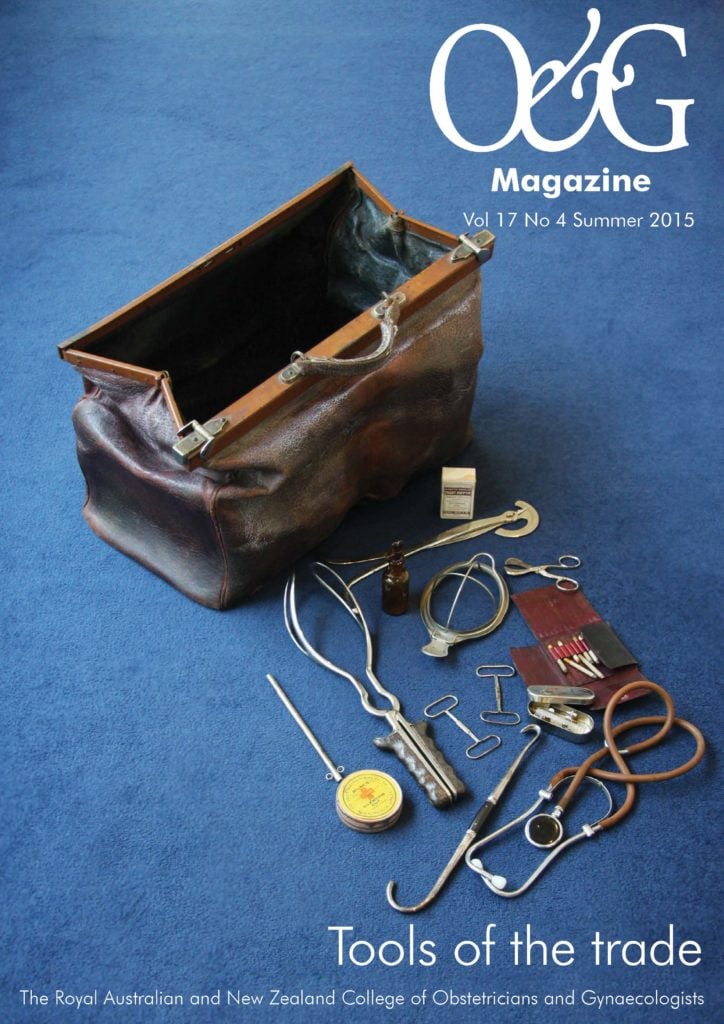Influenza vaccination
The article by Somerville, Dwyer and Kok (O&G Magazine Vol 17 No 2 Winter 2015) once again highlights the risks of influenza to the pregnant woman.1 Despite the compelling evidence of higher rates of hospitalisation, fetal loss and maternal death, the immunisation rates continue to hover around 50 per cent. The initial rise in vaccination rates following the H1N1 pandemic has plateaued.
The reasons for the low level of vaccination stems from poor recognition of the risks of influenza among both the general population and the health community, incorrect views on the safety of the vaccination and a lack of access to vaccinations within our current model of care.
It has been shown that the likelihood of vaccination being undertaken is increased when it is recommended by a healthcare provider; this was further increased if flu vaccination was offered at the time of the recommendation. Women who received both a recommendation and an offer were 1.6 times more likely to be vaccinated
(73.5 per cent) than women who received only a recommendation (45.1 per cent).2 In the absence of either a recommendation or an offer, the rate of immunisation was only 15.4 per cent. This is of concern when combined with the recent article by Maher, Dawson, Wiley et al that found that one-third of general practitioners did not believe that influenza infection was a significant risk to either the mother or baby and half of the general practitioners had concerns regarding the safety of the vaccination.3
The vaccination is safe, we have demonstrated this in several trials. There have been no reported significant adverse events, the majority of reactions being mild local effects or mild systemic symptoms such as fever, headache and myalgia. Sheffield et al found no links to congenital abnormalities.4 Naleway et al found no association between the vaccination and gestational diabetes, gestational hypertension, pre-eclampsia or chorioamnionitis.5 In fact, the studies in to safety have predominantly found benefits, with Omer et al finding lower risk of premature birth, small for gestational age and stillbirth. The Mothers Gift Project found a 36 per cent reduction in lower respiratory infection in those receiving vaccination and a 63 per cent reduction in influenza infections in infants younger than six months.6 The safety of the vaccination has been well established and we need to educate both our patients and fellow health professionals.
Influenza infection remains a serious health issue in pregnancy. Despite several attempts to improve vaccination levels, the overall rate has stagnated. Is it as simple as educating regarding the risks, addressing misconceptions and offering the vaccination at the time of the antenatal visit; or is it time for the government to undertake a comprehensive advertising campaign to increase the overall level of community knowledge of the risks of influenza to the mother and newborn child? The time to act is now.
References
- Somerville LK, Dwyer DE, Kok J; Influenza virus in pregnancy; O&G Magazine; 17; 2015; 40-43
- National Centre for Immunisation and Respiratory Disease. Pregnant women and the flu shots: internet panel survey. United States: National Center for Immunisation and Respiratory Disease; 2012.
- Maher L, Dawson A, Wiley K, et al. Influenza vaccination during pregnancy: a qualitative study of the knowledge, attitudes, beliefs and practices of general practitioners in Central and South Western Sydney; BMC Family Practice; 2014; 15; 102.
- Sheffield JG, Greer LG, Rogers VL, et al; Effect of Influenza vaccination in the first trimester of pregnancy; Obstet Gynaecol; 2012; 120; 3; 532-7.
- Naleway AL, Irving SA, Henninger ML, et al; Safety of influenza vaccination during pregnancy: a review of subsequent maternal obstetric events and findings from two recent cohort studies; Vaccine; 2014; 32 (26); 3122-7.
- Zaman K, Roy E, Arifeeen SE, et al; Effectiveness of maternal influenza immunisation in mothers and infants; N Engl J Med; 2008; 359; 1555-64.






Leave a Reply